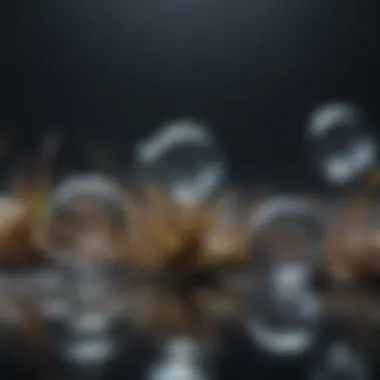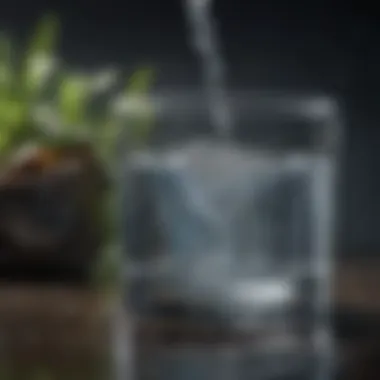Unveiling the Science of Water Filtration: An Educational Project Exploration


Nature Topic Overview
Water filtration is a vital process crucial in maintaining clean and safe water for consumption and various uses. Understanding the intricacies of water filtration is essential for both practical applications and theoretical knowledge.
Fun Facts and Trivia
- Water covers approximately 71% of the Earth's surface, with only a small percentage being suitable for human use due to contamination.
- Filtration is an ancient technique dating back to 2000 BC, when sand filters were used in Sanskrit scriptures for water purification purposes.
- Children can observe the effectiveness of filtration by creating a simple model using materials like sand, gravel, and charcoal at home.
Wildlife Explorations
Water filtration plays a critical role in maintaining the health of aquatic ecosystems, supporting a diverse range of species. Aquatic plants like water lilies help in natural water filtration by absorbing impurities.
Environmental Awareness
The importance of conservation and sustainability in water filtration cannot be overstated. Encouraging children to value and protect water sources is essential for promoting environmental stewardship. Simple practices like not disposing of pollutants in water bodies can make a significant impact.
DIY Nature Activities
Engaging children in hands-on filtration experiments can deepen their understanding of this topic. They can create mini water filtration systems using bottles, cotton balls, sand, and gravel to observe the purification process. Outdoor explorations to compare water clarity in different bodies like ponds and lakes further reinforce learning.
Introduction to Water Filtration
Water filtration plays a crucial role in maintaining a clean and safe water supply, especially in the context of scientific exploration. Delving into the world of water filtration sheds light on the significance of ensuring access to clean water, not just for human consumption but also for environmental sustainability. This article aims to unravel the complexities of water filtration through the lens of a science project, highlighting the interplay between scientific principles and real-world applications.
Understanding the Significance of Clean Water
The role of clean water in human health


Clean water is a fundamental requirement for human health, serving as a cornerstone for well-being and disease prevention. Access to clean water significantly impacts various aspects of human life, ranging from hydration and sanitation to overall physiological functions. The absence of clean water can give rise to a host of health concerns, including water-borne diseases and diminished immune responses. Recognizing the pivotal role that clean water plays in safeguarding human health underscores the necessity of effective water filtration systems to ensure a sustainable and healthy future.
Impact of contaminated water on communities
Contaminated water poses a severe threat to communities, leading to widespread health crises and environmental degradation. The repercussions of relying on contaminated water sources extend beyond individual health risks to encompass broader societal repercussions. Communities grappling with tainted water sources face challenges such as restricted economic growth, increased healthcare burdens, and compromised quality of life. Understanding the detrimental impact of contaminated water on communities emphasizes the urgency of implementing robust water filtration measures to mitigate risks and promote community well-being.
Science Behind Water Filtration
Principles of filtration and purification
The principles of filtration and purification form the backbone of water treatment processes, elucidating the mechanisms through which contaminants are removed from water sources. Filtration employs various physical and chemical processes to eliminate impurities, ensuring that water meets specified quality standards. Understanding these principles is essential for designing efficient filtration systems tailored to specific contamination levels and water requirements. By grasping the intricacies of filtration and purification principles, individuals can appreciate the scientific precision involved in achieving clean and potable water.
Different methods of water filtration
Diverse methods of water filtration offer adaptable solutions for addressing varying levels and types of water contamination. From sedimentation and coagulation to reverse osmosis and carbon filtration, each method brings unique advantages and limitations to the table. Exploring these methods provides valuable insights into the diverse approaches available for water purification, enabling individuals to select the most suitable method based on water quality parameters and filtration objectives. By dissecting the intricacies of different filtration methods, one gains a comprehensive understanding of the diverse strategies at play in ensuring access to clean and safe water.
Creating a Water Filtration Science Project
Exploring the creation of a Water Filtration Science Project in this enlightening article offers a gateway to understanding essential elements and benefits associated with such a project. The significance of hands-on experience in crafting a filtration system allows children to delve deeper into the realms of clean water and its pivotal role in sustaining life. This section serves as a foundation for practical application and scientific inquiry, instilling a sense of curiosity and responsibility towards environmental issues.
Materials Needed for the Project
List of Essential Materials
Delve into the realm of essential materials crucial for the success of a Water Filtration Science Project. Unveil the significance of each component, ranging from filter mediums to containers, elucidating their roles in the filtration process. In discussing the importance of these materials, emphasizing their efficacy in producing clean water outcomes becomes essential. Each essential material selected contributes uniquely to the project's success, enhancing the overall learning experience by showcasing their practical applications in real-life situations.
Optional Items for Advanced Experimentation


Explore optional items that elevate the project to an advanced level of experimentation. Delve into the realm of additional tools and materials that offer a deeper understanding of filtration processes. Highlight the benefits of incorporating these optional items, enriching the learning journey by challenging participants to explore beyond basic concepts. Assessing the advantages and disadvantages of these optional items provides insight into their impactful contributions to the project's overall complexity and educational value.
Step-by-step Project Guide
Building the Filtration System
Embark on the journey of constructing a filtration system, a fundamental step in the Water Filtration Science Project. Detail the sequential process of assembling the system, from selecting materials to designing the setup. Highlight the key features of the filtration system design, showcasing its efficiency in removing impurities from water. By exploring the nuances of system construction, participants gain valuable insights into engineering principles and the practical applications of filtration technology.
Testing and Observing the Filtration Process
Engage in the testing phase of the filtration system, where observations and data collection play a vital role in assessing performance. Delve into the methods of testing water quality before and after filtration, emphasizing the importance of accurate observations. By emphasizing the significance of systematic observation, participants develop critical thinking skills and analytical capabilities essential for drawing informed conclusions.
Analyzing Results and Drawing Conclusions
Analyze the results obtained from the filtration process, aligning observed data with initial expectations. Discuss the implications of filtration outcomes on water quality and the effectiveness of the system. Encouraging participants to draw conclusions based on evidence fosters scientific reasoning and logical deduction. By examining and interpreting results, individuals hone their analytical skills and gain a deeper understanding of filtration mechanisms.
Additional Challenges and Extensions
Exploring Varying Filtration Speeds
Delve into the intricacies of filtration speed variations, exploring the impact of flow rate on filtration efficiency. By experimenting with different speeds, participants gain insights into the relationship between flow dynamics and purification outcomes. Highlighting the significance of this challenge broadens participants' perspectives on filtration mechanisms and the optimization of water treatment processes.
Comparing Effectiveness of Different Filter Materials
Undertake a comparative analysis of various filter materials, evaluating their efficiency in removing contaminants from water. Discuss the characteristics of each material, highlighting its strengths and weaknesses in filtration applications. By contrasting different filter materials, participants develop a discerning eye for selecting optimal mediums based on filtration requirements. This extension challenge pushes the boundaries of experimentation, fostering a deeper understanding of material science and its implications on water purification processes.
Learning Outcomes and Future Implications


In this segment of the article, we delve into the essentiality of grasping the fundamentals of water filtration and the implications it carries for young minds. By engaging in a hands-on science project focusing on water filtration, children aged 5-12 can harness critical thinking skills and develop a deeper understanding of the significance of clean water. Through this exploration, kids not only enhance their scientific knowledge but also cultivate an appreciation for environmental stewardship. Empowering children with the knowledge of water filtration sets the stage for informed decisions and responsible actions towards sustainable living.
Educational Insights Gained
Understanding of Water Treatment Processes
The comprehension of water treatment processes is pivotal in the realm of water filtration science projects. This aspect sheds light on how water goes through purification stages to become safe for consumption. By comprehending the mechanisms behind water treatment, children can appreciate the complexity of delivering clean water to communities. Understanding water treatment processes nurtures a sense of responsibility towards conserving water resources and advocating for effective filtration methods. Encouraging curiosity and investigation into these processes fosters a proactive approach towards ensuring access to safe drinking water for all.
Appreciation for Clean Water Initiatives
Developing an appreciation for clean water initiatives is crucial for instilling a sense of environmental consciousness in young learners. Through hands-on exploration of water filtration in a science project, children learn to value the efforts invested in water conservation and quality maintenance. Grasping the importance of clean water initiatives instills a sense of empathy towards communities facing water scarcity and contamination challenges. By nurturing appreciation for clean water initiatives, children are motivated to contribute towards sustainable practices and advocate for accessible clean water for present and future generations.
Real-world Applications and Environmental Awareness
Impact of Water Filtration on Sustainable Living
The impact of water filtration on sustainable living underscores the role of filtration systems in promoting eco-friendly habits. By comprehending how water filtration contributes to sustainability, children gain insight into the interconnectedness of human activities and environment. Emphasizing the significance of water filtration in sustainable living encourages the adoption of conservation practices and responsible water usage. Understanding the impact of water filtration on sustainable living equips children with the knowledge to make informed decisions that prioritize environmental well-being and resource preservation.
Encouraging Eco-friendly Practices
Encouraging eco-friendly practices through water filtration projects instills a sense of environmental responsibility in children. By exploring the connection between filtration methods and eco-friendliness, young learners develop an awareness of how individual actions can impact the environment. Encouraging eco-friendly practices in water filtration initiatives promotes a mindset of conservation and sustainability in children. By fostering a culture of eco-consciousness, children are empowered to act as advocates for the environment and engage in practices that promote a greener, healthier planet.
Conclusion and Encouragement
In delving into the intricacies of water filtration through a science project, the importance of reflection and encouragement cannot be overstated. This final section serves as a vital component in summarizing the journey embarked upon by young minds engaging in this project. Reflection upon the project journey not only fosters a deeper understanding of the principles learned but also plays a substantial role in personal development and growth. Acknowledging the incremental progress made and the newfound insights gained can significantly impact a child's perspective on environmental consciousness and scientific inquiry. Encouragement also serves as a motivating force, propelling youngsters to not only celebrate their achievements in constructing a water filtration system but also to contemplate further environmental projects that align with their newfound knowledge and passion for sustainable living.
Reflecting on the Project Journey
Personal growth through scientific exploration
Venturing through the realms of scientific exploration within the context of this water filtration project cultivates a unique avenue for personal growth. By immersing themselves in the process of building and testing a filtration system, children develop essential skills such as problem-solving, critical thinking, and creativity. The hands-on experience enables them to grasp the practical application of scientific principles while fostering a sense of self-efficacy and accomplishment. This growth extends beyond the project itself, empowering young individuals to approach challenges with curiosity and resilience. Engaging in scientific exploration not only nurtures cognitive development but also instills a sense of environmental stewardship, fostering a generation attuned to the importance of sustainability.
Inspiration for future environmental projects
The inspiration derived from creating a water filtration system serves as a catalyst for embarking on future environmental projects. This section motivates children to channel their ingenuity and passion towards endeavors that contribute positively to the world around them. The hands-on nature of constructing a filtration system sparks a flame of creativity and innovation, encouraging youngsters to think beyond the boundaries of conventional problem-solving. By recognizing the impact of their actions in enhancing water quality through filtration, children are inspired to explore further initiatives aimed at preserving the environment. This inspiration transcends the confines of one project, imprinting a lasting enthusiasm for environmental conservation and sustainability, priming young minds for a future driven by eco-conscious decision-making.







